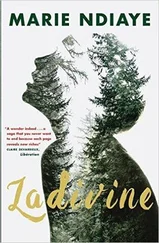She took a breath, then whispered:
“I have something amazing to. .”
But Vador broke in, her voice now timid and pious: “You were never much of a student, and now here you are a doctor. I’ll bet it took all you had.”
“That’s right,” said Zaka, uncomfortable for Marlène. She knew she was now supposed to ask “What about you?” But she had no wish to know what Vador had been up to, sensing that such talk would bring her nothing but boredom and dreariness.
Marlène Vador picked up her bag and her little red jacket. Then, Zaka told herself, she’d obviously gone on her way, slender and light, since she was no longer in the office when Zaka lowered the hand that she’d briefly laid over her eyes to shield them from the memory of something radiant and dazzling.
* * *
Doctor Zaka headed downstairs and out into the street’s wilting heat.
Sweat began to flow over her forehead, and her unquiet thoughts turned to another still, stifling summer, and a day when she’d seen her mother’s nape, and the napes of all the other mothers gathered on the lawn, suddenly bathed in the perspiration of horror and grief.
And now Doctor Zaka felt that same damp warmth down her neck as she hurried along the sidewalk toward the school.
How ridiculous, she told herself, all that sniveling, all that sweat, all that sorrow simply because a man had died, a perfect stranger to every one of those women on the lawn, although dearer to their wanting hearts than the many children they’d borne, than the husbands who had begotten them, whose eyes stayed dry on the death of that luminous, splendid stranger, so French, so blue-eyed, so blond-headed. A man had died, and Zaka’s mother was never the same again. She knew everything about that man, and that man had no idea she existed, but with that man’s essence Zaka’s mother had fueled her raging need to love with abundance and selflessness. Pitted against the glory, the magnetism of the French tongue so gracefully wielded, what hope was there for Zaka’s father, or any of the other fathers, with their d
Zaka’s mother never recovered. Had she glimpsed even the first stirring of a recovery, Zaka told herself, she would have violently crushed it out. None of the mothers wanted to be unburdened of their grief. What would be left, once they’d given up their sadness?
Doctor Zaka stopped before the iron bars of the school’s fence. In the fierce heat, the school wavered faintly before her eyes. She saw her daughter’s father slowly approaching, sweat streaming down his bloated face, his pants resting very low on his hips, held down by his pot belly. Their eyes met, and he blanched. A puff of contempt inflated Zaka’s lips. She shook her head no, her eyes cold, half-shut.
This wasn’t his week to pick up the child from school. He knew that, she could see it. So fierce was her hatred for this man that for a moment she thought it had blinded her, or that all this — the school, the fence, the ex-husband with the bulging bags under his eyes — had blown away on a whirlwind of rage. It was to see her, Zaka, that he’d come here today, because he couldn’t care less about the child, whom he never quite knew what to do with when he did have her.
Now she could see him again, pale and huge.
He was backing away, disappointed, eyeing Zaka with a gaze he tried to fill with deep and irrevocable meaning, but which was only plaintive, she thought, embarrassed to see him still there, reminding her of what she’d had to do to conceive her little girl.
She’d coupled with a white elephant, and that generous but slow-witted animal wouldn’t give up on the idea that it was her equal.
Doctor Zaka let out a strident laugh. People turned and stared. She took out a handkerchief, ran it over her short, thick, blond and gray hair, over her trickling nape.
Let them stare. They had no idea of the freakish intimacy that had taken place between the abject blimp now trudging away and herself, so poised and so lively, taut and unchanged, and no idea, what’s more, that to this day she remained an object of that stubborn elephant’s grimy affections.
Let them stare. Another sharp yelp escaped her. She felt cruel, unhinged, but stronger than all of them, snugly encased in a sheath of sarcasm and hardness from which Vador herself, that afternoon, could not have extracted her. She knew all about Vador’s virtue; she knew why, standing there before her, she’d so strongly felt her own betrayal, her failing.
It had to do with the death of Claude François. But it made absolutely no sense.
Doctor Zaka gently shook her head.
It made absolutely no sense.
And yet, on the pretext of an invented injury, Marlène Vador had come all the way to the center of Paris from the ragged-lawned suburban town where they’d once lived, simply to shame her for not keeping her word — or was that not it at all? Whatever it was, Marlène still didn’t know that Zaka had more than redeemed herself for anything she might hold against her.
But what about the death of Claude François?
Zaka was quivering faintly. Her metal sheath quivered along with her.
Though only a child at the time, Vador too had sternly rebuffed all thoughts of consolation, firmly resolved that the death of Claude François would be the epicenter of all her life’s upheavals, a life then in existence for only twelve years. And, Zaka remembered, there were so many women in their little housing project who had scrupulously honored their vow of eternal mourning, despite the passing years, despite the emergence of new, still handsomer singers.
They’d stood there, sweating and petrified, outside the apartment building. News of the death had drifted from a neighbor’s open window. One of them let out a moan — Zaka’s mother? Vador’s mother?
Vador’s mother hadn’t kept her word.
Then they were all weeping, crying out: no, it can’t be. .
Did Marlène really faint, or was Zaka making that up, there before the school gate, in the heat rising from the softening asphalt?
There was no doubt about it: Marlène had fainted.
Zaka felt stinging tears in her eyes.
Then the mothers were sad, and the children fell into a blank, jealous stupor.
Vador’s fickle, adorable mother alone soon developed a passion for another singer. But not Zaka’s mother, nor Zaka nor Marlène, and Marlène, in a sense, less than anyone. They took to praying each day for the repose of Claude François’s soul.
Zaka discreetly prodded her eyelids with both fists.
The mothers seemed reluctant to leave the lawn and go back to their apartments. They lingered, vacant and drained, stamping the dry grass with a solitude, a defeat, and an incomprehension so overwhelming that the children, afraid and unsettled, stole away from that yellowing patch, sat down on the sidewalk beside it, dully watching the clogged or slippered feet trampling what tomb? what body? in a desperate jig of love, the slender, pale, lightly freckled ankles of their mothers, still young, now suddenly unrecognizable. Zaka remembered that Claude François’s death shrouded the housing project in a melancholy with no escape.
All at once the girl was standing before her. Zaka let out a little cry:
“Paula!”
Then, in a tone of tender reproach:
“Where did you come from? Hey, Paula! Oh, for. .”
The child said nothing. She was watching something behind Zaka’s back, something that bent her mouth into a half-smile. A light glaze of sweat glistened on her forehead. Zaka turned around slowly, cautiously, lest a careless movement jar the invisible, protective sheath. She saw Paula’s father, standing motionless not far behind her. Dizzy with rage, she shouted:
“Will you go away? Will you get out of here? What do you want?”
Читать дальше












